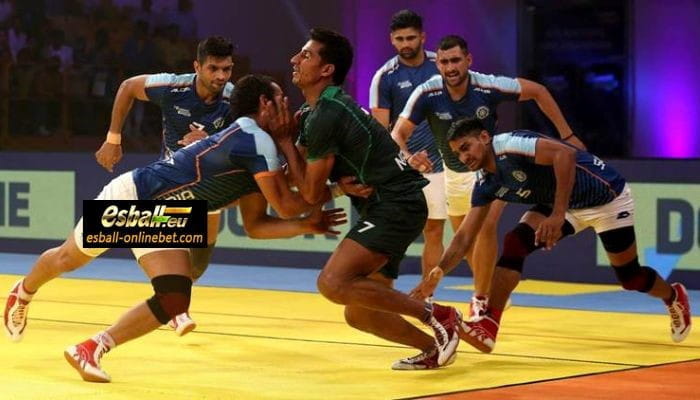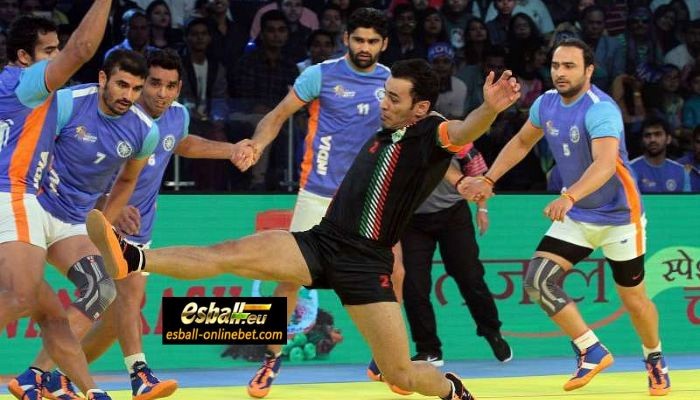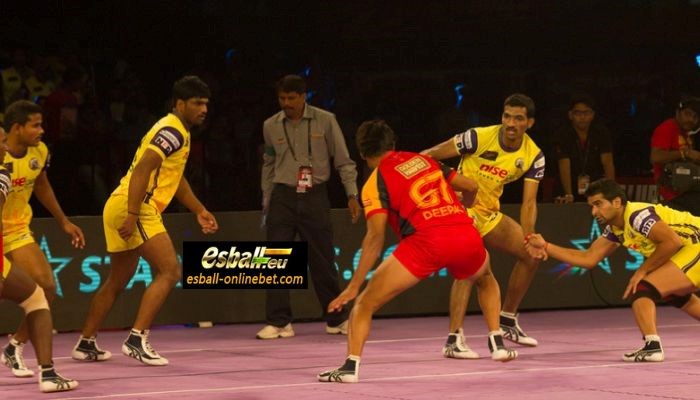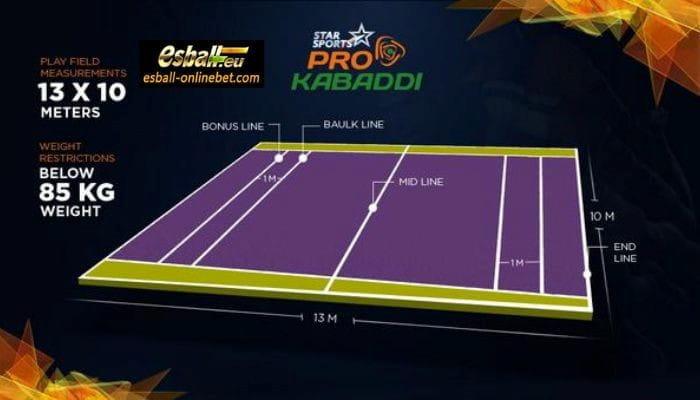Content
Learn the fouls in Kabaddi rules points, covering everything from basic Kabaddi rules, and team size rules to general kabaddi rules and fouls - a high-intensity, contact sport played across Asia.
The Basic Kabaddi Rules

Like any physical sport, There are certain basic rules that a player needs to keep in mind and follow for playing Kabaddi in a proper way. Let us discuss all the rules in a detailed manner. Flip a coin to decide which team will go first.
There are various methods to fairly decide which team goes first. You can opt for a random approach such as rolling the dice to determine the highest number or guessing a number that an impartial referee has in mind.
If your team goes first, send a "raider" across the midline
Kabaddi is a thrilling game that involves two teams taking turns sending their players, known as "raiders," across the midline to the opposing team's side of the court.
The objective of the raider is to tag members of the opposing team and return safely to his side within 30 seconds by following all certain Kabaddi rules. Every player touched by the raider earns one point for his team if he makes it back safely.
Interestingly, before crossing the midline, the raider must repeatedly shout "Kabaddi" and continue doing so until he returns to his own side; otherwise, it results in a scoreless play and awards one point to the defending team. To ensure fair play, each member of a team must raid in sequence; otherwise, it results in one point for their opponents.

If your team doesn't go first, defend
During a raid game, you become an "anti-raider" or "stopper" if your team does not go first. Your goal is to keep the raider from crossing the midline and tagging you.
This can be accomplished by either surpassing them until they run out of energy or physically detaining them by tackling or gripping their limbs and torso. It should be noted, however, that a raider may only be held on these body parts and not on their outerwear or hair.
Take turns alternating between raiding and defending
The game is divided into two halves of twenty minutes each, with a five-minute interval in between. The teams rotate between raiding and defending, with halftime signifying a change in court sides. The full-time winning squad will be the one with the highest.
Send players out when they are tagged, captured, or break a rule
In Kabaddi rules, players can be momentarily removed from the game for a variety of reasons. It should be noted that replacements are only authorized for players who are not currently on the bench. Here are various scenarios that could result in a player being sent out:
- If the raider tags any defensive players and returns to their side, the markedplayers are considered out.
- If a raider is apprehended and is unable to cross the midline before running out of air, they will be considered out.
- Any player who steps over the boundary lines, whether raiding or defending, will be ruled out (unless they were purposefully pulled or shoved; in such circumstances, the offending player will be sent out).
- If a team has three unsuccessful raids in a row, the third raider will be sent out. An unsuccessful raid occurs when a raider does not score (or even loses) any points throughout their raid. However, if they pass the baulk line and head back to their end without marking anyone, the raid is considered successful.
- Finally, if a member of the defensive team enters the raider's side of the court before their team is formally given permission to raid, they will be kicked out as well.
"Revive" Players by Getting an Opponent Out

During a match, when a member of the opposing team is eliminated, your team can revive a previously ruled-out player.
This opportunity applies to both raiding and defending teams. It's important to note that players must be revived in the order they were eliminated; reviving them out of sequence will result in a point for the other team.
Advanced Kabaddi Rules Points:
Score a "Super Tackle" by getting the raider out!
Super Tackle Kabaddi Rules Points
Moreover, if your defending team has less than three players on the court but still prevents the raider from returning to their side of the court, you earn an additional "super tackle" point. This extra point is awarded on top of the one earned for getting the raider out, resulting in two points total for that play.
Scoring Kabaddi Rules Points
- During a Kabaddi raid, a raider can score touchpoints by tagging one or more of the opposition players and successfully escaping to his own half without breaking the cant.
- However, if tackled by the opposition defenders during a raid, the raider is out of the game, and defending team earns one point which is also called tackle points in modern kabaddi.
- If a raider loses his cant during a raid or steps outside the boundary line, he's out, and defending team earns one point along with revival.
- On the other hand, if a team eliminates all seven players of the opposition team they earn two extra points via all-out or Lona. After scoring Lona, members of the opposition team are revived, and play resumes.
- A raider can also safely return without getting eliminated by crossing baulk line (either have both feet across it or have one foot across it while the other foot is on air). However, this safe return doesn’t result in any points won or revivals and are termed as an empty raid.
- Bonus points can be scored by planting one foot across the bonus line while having a trailing foot on air but only when defending team has six or more players on the mat.
- Throughout the sequence of play, if the defender/raider steps outside the boundary line they are out & opposing team gets one point along with revival. The lobby area is also out of bounds until the defender makes contact with the raider – known as struggle.
- In case of a tie in a knockout Kabaddi match, a mini-match consisting of two halves each lasting seven minutes is played to determine the winner. If extra time fails to establish a winner then sudden-death Golden Raid takes place where baulk line moves up to baulk line. If there’s still a draw even after Golden Raid then a winner is established through a coin toss.
- Score points when your opponents break the Kabaddi rules
Offense Kabaddi Rules Points

Kabaddi is a sport where the opposing team is awarded one point for certain offenses committed by the raider. To maintain fairness, there are rules in place to govern these offenses.
- If a raider chants anything other than the pre-approved "Kabbadi" chant while raiding, the defending team gets a point and the chance to raid, but the raider remains in play.
- Similarly, if a raider starts their chant late (after crossing the midline), or goes out of order, the defending team earns a point and gets to raid again without eliminating the raider.
- When multiple raiders enter at once or defenders enter before their turn to raid, points are awarded accordingly.
- If revived players fail to return within ten seconds after Lona or teammates attempt to help by calling out warnings or advice, points are given away.
- Moreover, if players deliberately get out in order to force Lona and revive their team members, each offending player on the field earns an extra point for the opposing team besides two Lona points already earned.
What are Fouls in Kabaddi
Here are several types of fouls in kabaddi that can be committed by players.
Includes:
- Crossing the mid-line: This occurs when a player crosses the mid-line of the playing field while attempting to tag an opposing player.
- Taking more than three steps: A player can only take three steps while holding their breath and attempting to tag an opposing player.
- Not tagging an opposing player: A player must physically touch an opposing player in order to score a point.
- Not holding your breath: A player must hold their breath while attempting to tag an opposing player.
- Not returning to the starting team area: A player must return to their starting team area after tagging an opposing player.
- Not completing a raid: A player must complete a raid by tagging an opposing player, returning to their starting team area, and taking a breath.
- Not being in the correct position: A player must be in the correct position in order to participate in a raid.
- Not following the rules: A player must follow all rules of the game in order to participate in a match.
- Not being a registered player: A player must be a registered player in order to participate in a match.
These are some examples of the most common fouls in Kabaddi, but there may be other specific rules and regulations that apply depending on the league or tournament.
These were the Kabaddi rules that need to be kept in mind for playing this energetic and enthralling sport.
? Claim 2025 IPL Free Casino Bonus Now ?
Click the picture to unlock the promotion and receive your exclusive IPL Esball Casino Code Bonus No Deposit!
Don't miss out on your chance to claim up to 50,000 for FREE! Only valid from 4/21! ⏳












